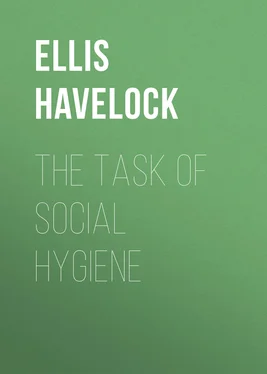Havelock Ellis - The Task of Social Hygiene
Здесь есть возможность читать онлайн «Havelock Ellis - The Task of Social Hygiene» — ознакомительный отрывок электронной книги совершенно бесплатно, а после прочтения отрывка купить полную версию. В некоторых случаях можно слушать аудио, скачать через торрент в формате fb2 и присутствует краткое содержание. Жанр: psy_sex_and_family, foreign_psychology, foreign_edu, на английском языке. Описание произведения, (предисловие) а так же отзывы посетителей доступны на портале библиотеки ЛибКат.
- Название:The Task of Social Hygiene
- Автор:
- Жанр:
- Год:неизвестен
- ISBN:нет данных
- Рейтинг книги:5 / 5. Голосов: 1
-
Избранное:Добавить в избранное
- Отзывы:
-
Ваша оценка:
- 100
- 1
- 2
- 3
- 4
- 5
The Task of Social Hygiene: краткое содержание, описание и аннотация
Предлагаем к чтению аннотацию, описание, краткое содержание или предисловие (зависит от того, что написал сам автор книги «The Task of Social Hygiene»). Если вы не нашли необходимую информацию о книге — напишите в комментариях, мы постараемся отыскать её.
The Task of Social Hygiene — читать онлайн ознакомительный отрывок
Ниже представлен текст книги, разбитый по страницам. Система сохранения места последней прочитанной страницы, позволяет с удобством читать онлайн бесплатно книгу «The Task of Social Hygiene», без необходимости каждый раз заново искать на чём Вы остановились. Поставьте закладку, и сможете в любой момент перейти на страницу, на которой закончили чтение.
Интервал:
Закладка:
When we survey this movement as a whole, we have to recognize that it is exclusively concerned with the improvement of the conditions of life. It makes no attempt to influence either the quantity or the quality of life. 7 7 This exclusive pre-occupation with the improvement of the environment has been termed Euthenics by Mrs. Ellen H. Richards, who has written a book with this title, advocating euthenics in opposition to eugenics.
It may sometimes have been carried out with the assumption that to improve the conditions of life is, in some way or other, to improve the quality of life itself. But it accepted the stream of life as it found it, and while working to cleanse the banks of the stream it made no attempt to purify the stream itself.
It must, however, be remembered that the arguments which, especially nowadays, are brought against the social reform of the condition of life, will not bear serious examination. It is said, for instance, or at all events implied, that we need bestow very little care on the conditions of life because such care can have no permanently beneficial effect on the race, since acquired characters, for the most part, are not transmitted to descendants. But to assume that social reform is unnecessary because it is not inherited is altogether absurd. The people who make this assumption would certainly not argue that it is useless for them to satisfy their own hunger and thirst, because their children will not thereby be safeguarded from experiencing hunger and thirst. Yet the needs which the movement of organized social reform seeks to satisfy are precisely on a level with, and indeed to some extent identical with, the needs of hunger and thirst. The impulse and the duty which move every civilized community to elaborate and gratify its own social needs to the utmost are altogether independent of the race, and would not cease to exist even in a community vowed to celibacy or the most absolute Neo-Malthusianism. Nor, again, must it be said that social reform destroys the beneficial results of natural selection.
Here, indeed, we encounter a disputed point, and it may be admitted that the precise data for absolute demonstration in one direction or the other cannot yet be found. Whenever human beings breed in reckless and unrestrained profusion—as is the case under some conditions before a free and self-conscious civilization is attained—there is an immense infantile mortality. It is claimed, on the one hand, that this is beneficial, and need not be interfered with. The weak are killed off, it is said, and the strong survive; there is a process of natural survival of the fittest. That is true. But it is equally true, as has also been clearly seen on the other hand, that though the relatively strongest survive, their relative strength has been impaired by the very influences which have proved altogether fatal to their weaker brethren. There is an immense infantile mortality in Russia. Yet, notwithstanding any resulting "survival of the fittest," Russia is far more ravaged by disease than Norway, where infantile mortality is low. "A high infantile mortality," as George Carpenter, a great authority on the diseases of childhood, remarks, "denotes a far higher infantile deterioration rate"; or, as another doctor puts it, "the dead baby is next of kin to the diseased baby," The protection of the weak, so frequently condemned by some Neo-Darwinians, is thus in reality, as Goldscheid terms it, "the protection of the strong from degeneration."
There is, however, more to be said. Not only must an undue struggle with unfavourable conditions enfeeble the strong as well as kill the feeble; it also imposes an intolerable burden upon these enfeebled survivors. The process of destruction is not sudden, it is gradual. It is a long-drawn-out process. It involves the multiplication of the diseased, the maimed, the feeble-minded, of paupers and lunatics and criminals. Even natural selection thus includes the need for protecting the feeble, and so renders urgent the task of social reform, while the more thoroughly this task is carried out with the growth of civilization, the more stupendous and overwhelming the task becomes.
It is thus that civilization, at a certain point in its course, renders inevitable the appearance of that wider and deeper organization of life which in the present volume we are concerned with under the name of Social Hygiene. That movement is far from being an abrupt or revolutionary manifestation in the ordinary progress of social growth. As we have seen, social reform during the past eighty years may be said to have proceeded in four successive stages, each of which has involved a nearer approach to the sources of life. The fourth stage, which in its beginnings dates only from the last years of the nineteenth century, takes us to the period before birth, and is concerned with the care of the child in the mother's womb. The next stage cannot fail to take us to the very source of life itself, lifting us beyond the task of purifying the conditions, and laying on us the further task of regulating the quantity and raising the quality of life at its very source. The duty of purifying, ordering, and consolidating the banks of the stream must still remain. 8 8 Not one of the four stages of social reform already summarized can be neglected. On the contrary, they all need to be still further consolidated in a completely national organization of health. I may perhaps refer to the little book on The Nationalization of Health , in which, many years ago, I foreshadowed this movement, as well as to the recent work of Professor Benjamin Moore on the same subject. The gigantic efforts of Germany, and later of England, to establish National Insurance systems, bear noble witness to the ardour with which these two countries, at all events, are moving towards the desired goal.
But when we are able to control the stream at its source we are able to some extent to prevent the contamination of that stream by filth, and ensure that its muddy floods shall not sweep away the results of our laborious work on the banks. Our sense of social responsibility is developing into a sense of racial responsibility, and that development is expressed in the nature of the tasks of Social Hygiene which now lie before us.
It is the control of the reproduction of the race which renders possible the new conception of Social Hygiene. We have seen that the gradual process of social reform during the first three quarters of the nineteenth century, by successive stages of movement towards the sources of life, finally reached the moment of conception. The first result of reform at this point was that procreation became a deliberate act. Up till then the method of propagating the race was the same as that which savages have carried on during thousands of years, the chief difference being that whereas savages have frequently sought to compensate their recklessness by destroying their inferior offspring, we had accepted all the offspring, good, bad, and indifferent, produced by our indiscriminate recklessness, shielding ourselves by a false theology. Children "came," and their parents disclaimed all responsibility for their coming. The children were "sent by God," and if they all turned out to be idiots, the responsibility was God's. But when it became generally realized that it was possible to limit offspring without interfering with conjugal life a step of immense importance was achieved. It became clear to all that the Divine force works through us, and that we are not entitled to cast the burden of our evil actions on any Higher Power. Marriage no longer fatally involved an endless procession of children who, in so far as they survived at all, were in a large number of cases doomed to disease, neglect, misery, and ignorance. The new Social Hygiene was for the first time rendered possible.
It was in France during the first half of the nineteenth century that the control of reproduction first began to become a social habit. In Sweden and in Denmark, the fall in the birth-rate, though it has been irregular, may be said to have begun in 1860. It was not until about the year 1876 that, in so far as we may judge by the arrest of the birth-rate, the movement began to spread to Europe generally. In England it is usual to associate this change with a famous prosecution which brought a knowledge of the means of preventing conception to the whole population of Great Britain. Undoubtedly this prosecution was an important factor in the movement, but we cannot doubt that, even if the prosecution had not taken place, the course of social progress must still have pursued the same course. It is noteworthy that it was about this same period, in various European countries, that the tide turned, and the excessively high birth-rate began to fall. 9 9 In some countries, however, the decline, although traceable about 1876, only began to be pronounced somewhat later, in Austria in 1883, in the German Empire, Hungary and Italy in 1885, and in Prussia in 1886. Most of these countries, though late in following the modern movement of civilization initiated by France, are rapidly making their way in the same direction. Thus the birth-rate in Berlin is already as low as that of Paris ten years ago, although the French decline began at a very early period. In Norway, again, the decline was not marked until 1900, but the birth-rate has nevertheless already fallen as low as that of Sweden, where the fall began very much earlier.
Recklessness was giving place to foresight and self-control. Such foresight and self-control are of the essence of civilization. 10 10 "Foresight and self-control is, and always must be, the ground and medium of all Moral Socialism," says Bosanquet ( The Civilization of Christendom , p. 336), using the term "Socialism" in the wide and not in the economic sense. We see the same civilized growth of foresight and self-control in the decrease of drunkenness. Thus in England the number of convictions for drunkenness, while varying greatly in different parts of the country, is decreasing for the whole country at the rapid rate of 5000 to 8000 a year, notwithstanding the constant growth of the population. It is incorrect to suppose that this decrease has any connection with decreased opportunities for drinking; thus in London County and in Cardiff the proportion of premises licensed for drinking is the same, yet while the convictions for drunkenness in 1910 were in London 83 per 10,000 inhabitants, in Cardiff they were under 6 per 10,000.
Интервал:
Закладка:
Похожие книги на «The Task of Social Hygiene»
Представляем Вашему вниманию похожие книги на «The Task of Social Hygiene» списком для выбора. Мы отобрали схожую по названию и смыслу литературу в надежде предоставить читателям больше вариантов отыскать новые, интересные, ещё непрочитанные произведения.
Обсуждение, отзывы о книге «The Task of Social Hygiene» и просто собственные мнения читателей. Оставьте ваши комментарии, напишите, что Вы думаете о произведении, его смысле или главных героях. Укажите что конкретно понравилось, а что нет, и почему Вы так считаете.












